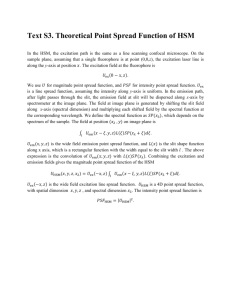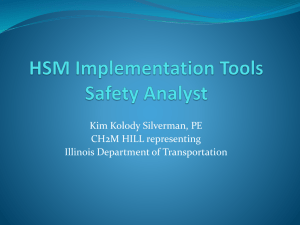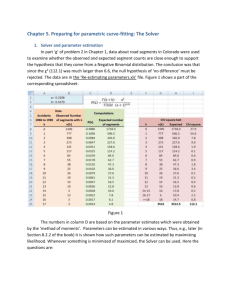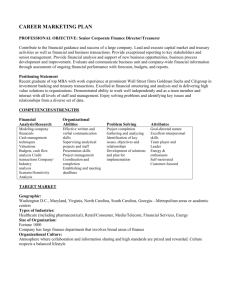Course Descriptions - McNeese State University
advertisement
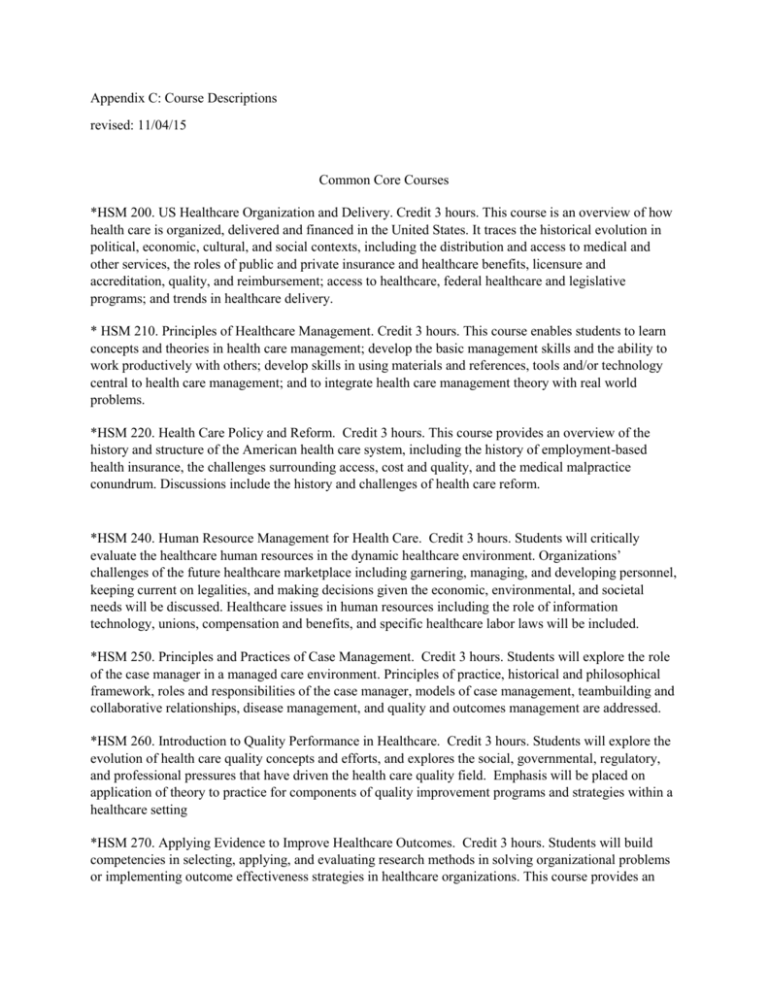
Appendix C: Course Descriptions revised: 11/04/15 Common Core Courses *HSM 200. US Healthcare Organization and Delivery. Credit 3 hours. This course is an overview of how health care is organized, delivered and financed in the United States. It traces the historical evolution in political, economic, cultural, and social contexts, including the distribution and access to medical and other services, the roles of public and private insurance and healthcare benefits, licensure and accreditation, quality, and reimbursement; access to healthcare, federal healthcare and legislative programs; and trends in healthcare delivery. * HSM 210. Principles of Healthcare Management. Credit 3 hours. This course enables students to learn concepts and theories in health care management; develop the basic management skills and the ability to work productively with others; develop skills in using materials and references, tools and/or technology central to health care management; and to integrate health care management theory with real world problems. *HSM 220. Health Care Policy and Reform. Credit 3 hours. This course provides an overview of the history and structure of the American health care system, including the history of employment-based health insurance, the challenges surrounding access, cost and quality, and the medical malpractice conundrum. Discussions include the history and challenges of health care reform. *HSM 240. Human Resource Management for Health Care. Credit 3 hours. Students will critically evaluate the healthcare human resources in the dynamic healthcare environment. Organizations’ challenges of the future healthcare marketplace including garnering, managing, and developing personnel, keeping current on legalities, and making decisions given the economic, environmental, and societal needs will be discussed. Healthcare issues in human resources including the role of information technology, unions, compensation and benefits, and specific healthcare labor laws will be included. *HSM 250. Principles and Practices of Case Management. Credit 3 hours. Students will explore the role of the case manager in a managed care environment. Principles of practice, historical and philosophical framework, roles and responsibilities of the case manager, models of case management, teambuilding and collaborative relationships, disease management, and quality and outcomes management are addressed. *HSM 260. Introduction to Quality Performance in Healthcare. Credit 3 hours. Students will explore the evolution of health care quality concepts and efforts, and explores the social, governmental, regulatory, and professional pressures that have driven the health care quality field. Emphasis will be placed on application of theory to practice for components of quality improvement programs and strategies within a healthcare setting *HSM 270. Applying Evidence to Improve Healthcare Outcomes. Credit 3 hours. Students will build competencies in selecting, applying, and evaluating research methods in solving organizational problems or implementing outcome effectiveness strategies in healthcare organizations. This course provides an overview of the skills needed in daily operations for gathering statistical data used in planning and evaluating processes in the healthcare workplace. *HSM 350. Healthcare and Regulatory Law. Credit 3 hours. Prerequisites: HSM 200 and HSM 210 or permission of Department Head. This course builds competencies in applying conceptual aspects of legislation, law, regulations, and standards in health informatics, evaluating legal aspects of risk management and quality improvement initiatives, applying ethics to health information management, and analyzing how compliance requirements impact healthcare organizations. *HSM 355. Healthcare Reimbursement Systems. Credit 3 hours. Prerequisites: HSM 200 and HSM 210 or permission of Department Head. This course introduces financial management of healthcare services and focuses on identification of costs of care and payment systems for medical services, explains the impact of benefit design on provider and patient behavior with particular focus on managed care versus fee for service models, and reviews data sources and their applicability to economic analysis, including inpatient billing and cost-accounting systems. *HSM 360 Fundamentals of Epidemiology. Credit 3 hours. Prerequisites: STAT 231 or permission of Department Head. An introduction to the study of distribution of health events in human populations. Methods of assessing health states in populations by the use of morbidity and mortality data. Includes disease tracking and control methods for use in health care decisions. Major types of epidemiological investigations are also studied. *HSM 365. Healthcare Quality Safety Measurement and Outcomes Analysis I. Credit 3 hours. Prerequisites: HSM 200 and HSM 210 or permission of Department Head. This course establishes a basis for critical analysis of issues in healthcare quality and safety and presents conceptual and scientific approaches to management. *HSM 370. Integrated Care and Health Systems. Credit 3 hours. Prerequisites: HSM 200 and HSM 210 or permission of Department Head. Students will explore managed care from various perspectives and the progression of healthcare to managed care including various structures and components of the managed care system. Four key perspectives will be discussed including the healthcare provider, health system, employer, and consumer and their unique attributes, challenges, and operational issues. An analysis with application of managed care operations, including payment and reimbursement systems, legal issues including information brokering, privacy of information, and retrieval of information, clinical and business applications of information technology, contract negotiation, benchmarking, and outcomes management within various healthcare settings will be highlighted. *HSM 375. Data Management. Credit 3 hours. Prerequisites: HSM 200 and HSM 210, or permission of Department Head. Students will learn the skills and competencies in health data structures, usage, and data collection tools, data quality assessment and integrity, types and content of health records, and health information standards and regulations for documentation. *HSM 380. Introduction to Human Disease. Credit 3 hours. Prerequisites: BIOL 100, BIOL, 225, BIOL 226, or permission of Department Head. This course builds upon a student’s understanding of human anatomy and physiology and integrates the study of human disease with the focus on the risk factors, clinical manifestations, pathology, and prevention. Common disease states in the adult population will be studied. *HSM 400. Introduction to Healthcare Finance. Credit 3 hours. Prerequisites: HSM 200 and HSM 210 or permission of Department Head. An introduction to healthcare reimbursement systems, the regulatory environment, general accounting, cost concepts, product costing, strategic planning and an introduction to the operating budget. Emphasis will be on understanding and interpreting financial information, concepts and techniques of financial analysis and the decision-making process in the health care environment. *HSM 410. Health Informatics. Credit 3 hours. Prerequisites: HSM 200 and HSM 210 or permission of Department Head. An introduction to project planning, management, evaluation, and the adoption of new technologies in diverse healthcare settings. Topics include competencies in evaluating medical practice workflow and functional needs of end-users, evaluating data infrastructure and information technology processes and systems, and analyzing the fiscal and human resource commitment needed in all phases of implementing and adopting new technologies. *HSM 420. Healthcare Innovation: Managing Effectively in a Changing Environment. Credit 3 hours. Prerequisites: HSM 400 and HSM 410, or permission of Department Head. An exploration of healthcare reform, including the impacts and considerations of HIPAA, the enabling roles that process design and improvement and information technology play in helping organizations meet meaningful use criteria; and the importance of leveraging organizational change management to help the people in organizations quickly adopt and proficiently use new processes and technology. *HSM 430. Institutional Collaboration and Communication in Health Care. Credit 3 hours. Prerequisites: HSM 400 and HSM 410 or permission of Department Head. This course will discuss the importance of communication and the connection between communication and medical error, the standards of effective communication, national and institutional patient safety goals, strategies for information exchange. Students will be able to identify barriers, tools, strategies and outcomes to effective collaboration and communication. Concentration Courses Healthcare Management Concentration *HSM 433. Strategic Management in Health Care Organizations. Credit 3 hours. Prerequisites: HSM 400 and HSM 410, or permission of Department Head. A detailed study of the development and implementation of strategy and market positioning by health care organizations in the changing health care marketplace and stresses practical approaches to articulate an organization's mission and vision with strategies to meet external and internal situations. Topics include: external and internal assessment, strategy development and implementation, market positioning, organizational structures to support strategy, provider-purchaser relationships, and governance and management structures. *HSM 436. Systems Analysis in Health Care. This course prepares individuals to apply programming and systems analysis principles to the selection, implementation, and troubleshooting of customized computer and software installations in a health care setting.. Topics include: computer hardware and software; compilation, composition, execution, and operating systems; low-and high-level languages and language programming; programming and debugging techniques; installation and maintenance testing and documentation; process and data flow analysis; user needs analysis and documentation; cost-benefit analysis; and specification design. A lab fee is required for this course. *HSM 439. Leadership Skill Development for the Mid-Level Manager. Credit 3 hours. Prerequisites: HSM 400 and HSM 410, or permission of Department Head. An exploration of individual leadership styles, the characteristics of effective leaders and ways to develop personal goals and strategies for becoming a more effective leader of healthcare teams. Specific leadership concepts include: operational (team performance, commitment and motivation, delegation, and time and stress management); relational (communications, negotiation and conflict management, coaching, and counseling and interviewing); and analytic (budgeting, managing financial and human resources, strategic thinking and decision making, and evaluating organizational and personal resources). *HSM 442. Performance Initiatives. Credit 3 hours. Prerequisites: HSM 400 and HSM 410, or permission of Department Head. A discussion of performance initiatives aimed at improving the quality, efficiency, and overall value of health care. Specific topics include: feasibility, defining performance, program development, performance evaluation methods, and administration of performance appraisals. These arrangements provide financial incentives to hospitals, physicians, and other health care providers to carry out such improvements and achieve optimal outcomes for patients. *HSM 480. Project Management Fundamentals in Healthcare Systems. Credit 3 hours. Prerequisites: HSM 400 and HSM 410 or permission of Department Head. The focus of this course is to provide students an overview of various healthcare systems and projects associated with these systems. This course reviews the basics of project management and includes hands-on application through a workrelated project. Students learn to maximize time, money and personnel by using efficient techniques for managing projects in the healthcare systems. *HSM 497. Internship in Healthcare Management. Credit 8 hours. Prerequisites: HSM 400 and HSM 410 or permission of Department Head. This is a senior-level internship where students engage in practical experiences in the field. A minimum of 320 hrs. is required. Students will demonstrate the ability to apply concepts, methods and theories of healthcare management in a healthcare setting. Healthcare Quality Improvement Concentration *HSM 445. Tools and Methods for Healthcare Quality and Safety Improvement. Credit 3 hours. Prerequisites: HSM 400 and HSM 410 or permission of Department Head. A detailed study of systemsthinking methods and how systems’ thinking is applied within the healthcare system. This course provides tools and methods for improving quality and safety within the healthcare system. *HSM 448. Risk Management. Credit 3 hours. Prerequisites: HSM 400 and HSM 410, or permission of Department Head. A discussion of general and high-risk management strategies within the healthcare industry such as legal concepts, development of risk management programs and effective governance. Topics include: risk financing, ethics, patient communication, credentialing of providers, contract review concepts, employment liability, and patient and occupational safety. *HSM 451. Research & Evaluation Methods for Quality and Safety Improvement. Credit 3 hours. Prerequisites: HSM 400 and HSM 410 or permission of Department Head. A review of health services research methodology and its application in evaluation of healthcare programs, including quality and safety improvement interventions. *HSM 454. Healthcare Quality and Safety Measurement and Outcomes Analysis II. Credit 3 hours. Prerequisites: HSM 365, HSM 400, and HSM 410, or permission of Department Head. A critical analysis of issues in healthcare quality and safety and conceptual and scientific approaches to management. This course requires demonstrated competencies in analyzing how quality improvement programs are developed, implemented, and improved; and skills necessary for management in the healthcare environment. *HSM 481. Project Management Fundamentals in Healthcare Quality Improvement. Credit 3 hours. Prerequisites: HSM 400 and HSM 410 or permission of Department Head. The focus of this course is to provide students the history of healthcare quality improvement and an overview of various healthcare quality improvements initiatives. This course reviews the basics of project management and includes hands-on application through a work-related project. Students learn to maximize time, money and personnel by using efficient techniques for managing projects in healthcare quality improvement programs. *HSM 498. Internship in Healthcare Quality Improvement. Credit 8 hours. Prerequisites: HSM 400 and HSM 410 or permission of Department Head. This is a senior-level internship where students engage in practical experiences in the field. A minimum of 320 is required. Students will demonstrate the ability to apply concepts, methods and theories of healthcare quality improvement in a healthcare setting. Care Coordination Concentration NURS 330 Introduction to Pharmacology (3 credits). Credit 3 hours. Prerequisites: BIOL 225, BIOL 226, or permission of Department Head. General principles of drug therapy and the role of the health professional in pharmacological therapy of patients. Focuses on major drug classifications. *HSM 463 -Health Coaching for Behavior Change. (3 credits). Prerequisite: Junior standing, and HSM 430 or permission of Department Head. Students will explore and apply principles of modifying health behaviors on an individual, group, and community level for the prevention of health problems or the adoption of healthy lifestyles. Emphasis is placed on introducing the role of the Health Coach and the use of Motivational Interviewing and counseling skills for assisting others in confronting personal health concerns. *HSM 467. Care Coordination in the Community. Credit 3 hours. Prerequisites: HSM 400 and HSM 410, or permission of Department Head. This course focuses on the comprehensive identification and indexing of community resources across the life span in a wide variety of settings such as, family welfare organizations, disability services, youth services, child protection and community health services, vocational services, and employment. *HSM 470. Specialty Practices in Care Management. Credit 3 hours. Prerequisites: HSM 400 and HSM 410 or permission of Department Head. An examination of the care components of patient assessment, planning of care, coordinating and facilitating care plans for patients, working within and across the continuum of care, evaluating care provided, reassessing, mapping of care , evaluation, cost and quality containment strategies and patient advocacy. Specific topics include history and advocacy of case managers, case management best practices, insurance and alternative finance options, resource utilization management, and life care planning. *HSM 482. Project Management Fundamentals in Care Coordination. Credit 3 hours. Prerequisites: HSM 400 and HSM 410 or permission of Department Head. The focus of this course is to provide students an overview of roles and responsibilities of healthcare coordinator and of review of significant care coordination initiatives. This course reviews the basics of project management and includes hands-on application through a work-related project. Students learn to maximize time, money and personnel by using efficient techniques for managing projects in the healthcare care coordination programs. *HSM 499. Internship in Care Coordination. Credit 8 hours. Prerequisites: HSM 400 and HSM 410 or permission of Department Head. This is a senior-level internship where students engage in practical experiences in the field. A minimum of 320 hrs. is required. Students will demonstrate the ability to apply concepts, methods and theories of medical case management in a healthcare setting.
